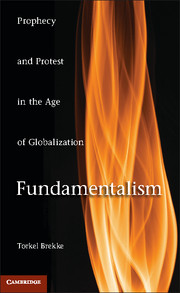Book contents
- Frontmatter
- Contents
- Acknowledgments
- Introduction
- Part I The Historical and Ideological Context of Fundamentalism
- Part II Fundamentalist Struggles
- 5 The Struggle for the State
- 6 The Struggle over Law
- 7 The Struggle for the Sciences
- 8 The Struggle over Education
- 9 The Struggle over Women
- Conclusion
- Bibliography
- Index
- References
5 - The Struggle for the State
from Part II - Fundamentalist Struggles
Published online by Cambridge University Press: 05 June 2012
- Frontmatter
- Contents
- Acknowledgments
- Introduction
- Part I The Historical and Ideological Context of Fundamentalism
- Part II Fundamentalist Struggles
- 5 The Struggle for the State
- 6 The Struggle over Law
- 7 The Struggle for the Sciences
- 8 The Struggle over Education
- 9 The Struggle over Women
- Conclusion
- Bibliography
- Index
- References
Summary
We saw in the chapters of Part I that one of the defining characteristics of fundamentalist movements is their wish to halt or reverse the trend that we called differentiation so that religion can reassert the influence it has lost in the modern world. All fundamentalist movements, then, will have opinions about the role of religion in one or more of the important societal spheres of modern societies. States wield ultimate power in the modern world, and sometimes fundamentalist organizations and movements with high ambitions work to take control of the state. Some fundamentalist movements have an all-embracing vision of how to establish a state that is guided by the right religious values and laws, and how to mold a nation observing those values and laws. Sometimes these visions have motivated violent struggles against state authorities.
The Islamic Caliphate
I started this book with a brief look at a Kurdish militant leader, mullah Krekar, who in many respects is the embodiment of Muslim fundamentalism as it is cast in modern media. In spring 2003, his organization, Ansar al-Islam, was accused of harboring al Qaeda fighters and cooperating with agents of Saddam Hussein. The U.S. State Department and other branches of the U.S. government were worried that Saddam Hussein could offer weapons of mass destruction to the fighters and their comrades in the al Qaeda network. This worry seems unrealistic now, as we know that mullah Krekar had his hands full with his military campaign against far stronger Kurdish secular organizations, in particular the Patriotic Union of Kurdistan (PUK). Kurds have been fighting for independence from Iraq for several decades, and the PUK was an ally of the U.S. forces during the invasion that started in March 2003. Thus, Islamist Kurdish organizations like Ansar al-Islam, which from the start enjoyed very limited support among Kurds, lost out and became irrelevant to future political developments.
- Type
- Chapter
- Information
- FundamentalismProphecy and Protest in an Age of Globalization, pp. 101 - 139Publisher: Cambridge University PressPrint publication year: 2011



